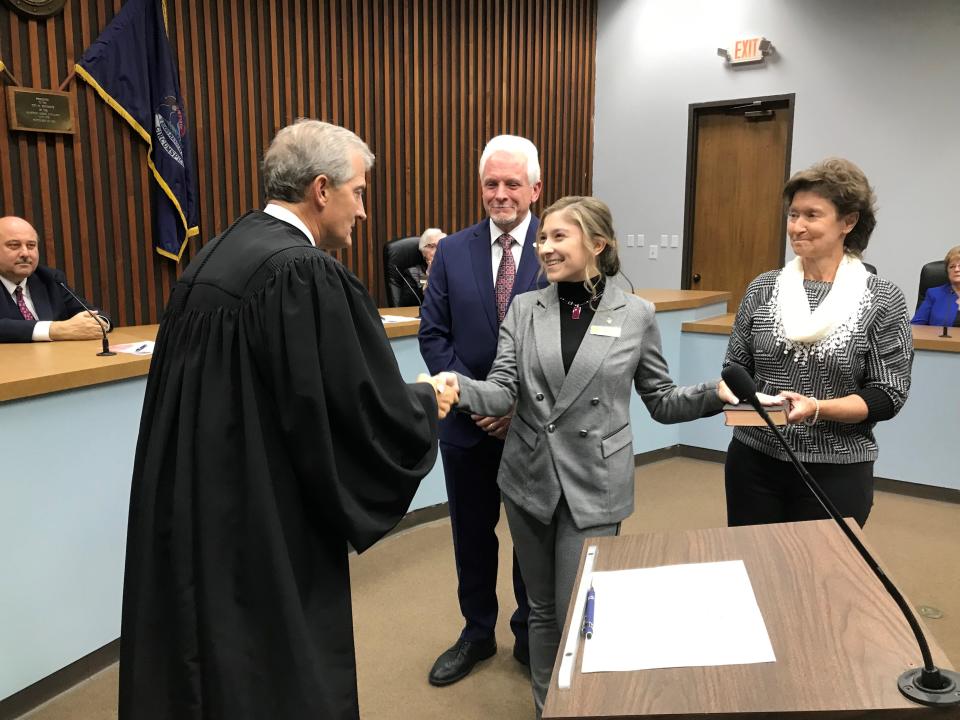Question looms: When cities meet to swear in officials and judges, will it be legal?
Across metro Detroit and Michigan on Monday night — and in some places on Tuesday night — cities are holding council meetings with history on their agendas.
They planned to swear in elected officials, following last week’s election. But there’s a hiccup in those rituals, caused by a recent change in state law.
The new law gives more time – six days after the election − for city clerks to receive ballots from military members and overseas voters. With the longer wait, a question arises: Will cities that hold swearing-in rituals before that period ends be doing so illegally?
To duck that question, Troy planned to postpone its administration of oaths a full week, from Monday night until Nov. 20. That’s a violation of its own city charter, which says the oaths must be administered and terms of office begin at the first council meeting after an election.
But Troy has called for its former councilmembers to convene on Monday night, in a resolution that says the swearing-in won’t occur until the Oakland County Board of Canvassers certifies the election results and that, under the new state law, “this certification process will not be completed until after Nov. 13.”
In contrast, Grosse Pointe Woods was going ahead Monday night with administering oaths of office because, as its mayor told the Free Press, Wayne County’s canvassers would certify the election results of Grosse Pointe Woods by 4 p.m. Monday.
Yet, the top two election officials with Oakland County, known statewide for its high standards in elections, said they believe it’s not possible for any county in Michigan with ballots not yet received from military members or overseas voters to have election results fully certified until later this week. The new six-day waiting period wouldn't be over until Monday evening, said Oakland County Director of Elections Joe Rozell. That means the cities’ last ballots won’t be counted and results delivered to the county until Tuesday, after which they need to be processed, Rozell said. The county’s Board of Canvassers won’t be able to certify results until “probably Thursday or Friday of this week,” he said.
Cities like Grosse Pointe Park, administering oaths on Monday, and Warren, which did so on Saturday, are choosing to operate from unofficial results, contrary to state law. The Wayne County Clerk’s office did not respond Monday to a request for comment.

“By the way, Troy is not going it alone” by delaying its swearing-in ceremony, Rozell said. Huntington Woods, where Rozell is an elected city commissioner and mayor pro tem, also has decided to delay its administration of oaths and the start of its new terms of office, he said.
Oakland County Clerk Lisa Brown said that, nearly a year ago, she issued a warning of the impending problem to the legislative committee of the Michigan Association of County Clerks. And Brown said she informed Oakland County's clerks that they still had time to have voters revise city charters to fit the new law. None did.
“Even townships, which use Nov. 20 to start their terms of office – they could have problems with this next year,” Brown said, adding: “It’s really a full week after the election day that we need to bring these overseas military ballots in.”
The permanent remedy needs to come from the Legislature, she said. In the short term, “We put out an email to all our local clerks to say, ‘You should consult with your legal counsel and do what is appropriate for your city.’ That’s really all we can do right now,” Brown said.
In recent weeks, the Legislature tried in vain to fix the problem, working with the Michigan Association of Municipal Clerks, but it was difficult to find a statewide remedy when dealing with scores of differing city, township, and village charters, said Mike Siegrist, the elected clerk of Canton Township and spokesman for the statewide association.
“I think they’re looking at changing it so everybody, everywhere, takes office on Jan. 1” or some other common date, said Siegrist, who is president of the Association of Wayne County Clerks. “That would be a huge change (and) would override all the city charters,” he said.
The new law is something that Michiganders asked for last year, when voters passed a package of improvements to voting in a statewide ballot measure labeled Proposal 2, and known as "Promote the Vote." Until a statewide remedy is passed, cities must go it alone this week, deciding whether to abide by their local charters or follow the terms of the new state law, which takes precedence over local city, township, and village charters, Siegrist said. In Canton, he swears in township police officers, library board members, and township trustees, although because township elections won’t occur until 2024, he has no oaths to administer this week.
“You really don’t want to swear in people if the election has not been certified. None of this is spelled out yet in law, but state government is going to say, you’re swearing in people while you’re still counting ballots for the six-day period,” Siegriest said.
Contact Bill Laytner: blaitner@freepress.com
This article originally appeared on Detroit Free Press: Troy and others to postpone oaths in Michigan's post-election tizzy

